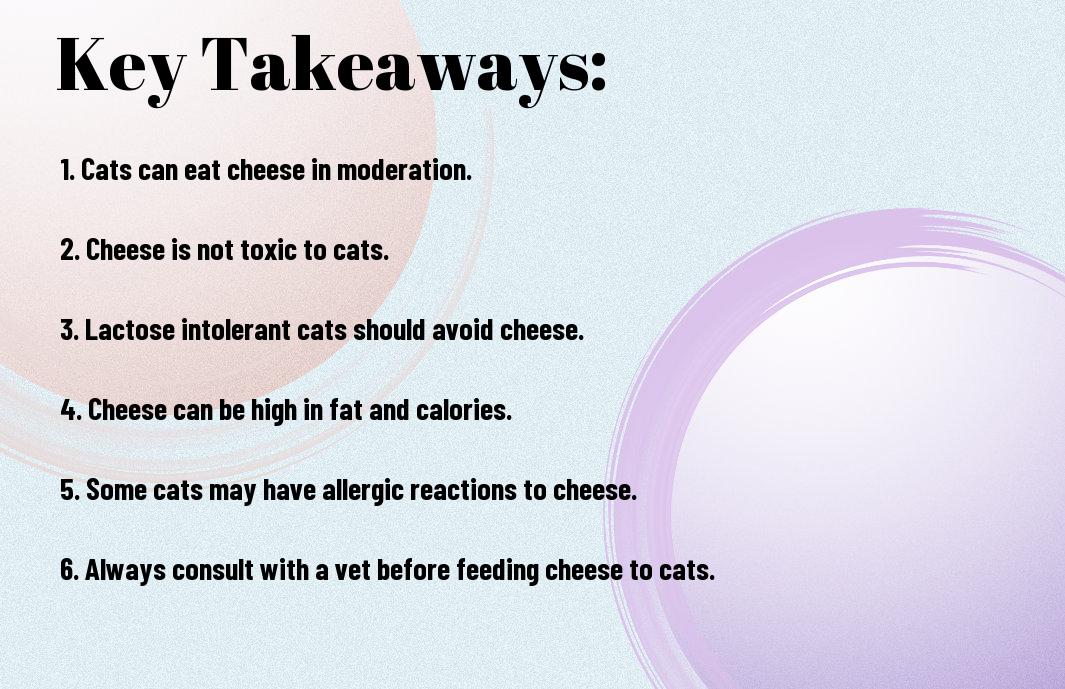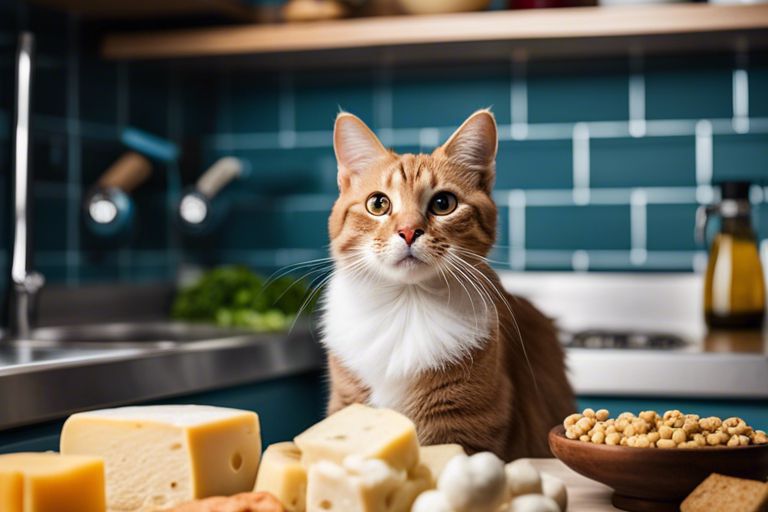Have you ever wondered whether it is safe to feed your feline companions cheese? While cheese may seem like a harmless and tasty treat for your cats, there are important factors to consider before offering it to them. Cheese contains high levels of fat and lactose, which can have adverse effects on the digestive system of cats. Additionally, some cats may be lactose intolerant and experience gastrointestinal discomfort or diarrhea after consuming cheese. However, in moderation, certain types of cheese can be a source of protein and calcium for cats. In this informative blog post, we will explore the potential risks and benefits of feeding cheese to cats and provide guidance on making informed decisions about their diet.

Understanding Feline Nutrition
Even though cheese is a popular treat for many cats, it’s essential to understand the basics of feline nutrition before offering it to your furry friends. For more comprehensive information on the topic, you can also visit Can Cats Eat Cheese?.
Basic Dietary Requirements of Cats
For cats to thrive and stay healthy, their diet must include a balance of essential nutrients such as proteins, fats, carbohydrates, vitamins, and minerals. Cats are obligate carnivores, meaning their primary source of nutrients should come from animal-based ingredients like meat and fish.
It’s crucial to offer products that are specifically formulated to meet your cats’ dietary needs, ensuring they receive all the necessary nutrients for a healthy and active life.
How Dairy Affects Cats
The consumption of dairy products like cheese can have mixed effects on cats. The lactose in dairy can cause digestive upset in many cats, leading to symptoms such as diarrhea, vomiting, and gastrointestinal discomfort. Plus, some cats may be lactose intolerant, making dairy products harmful to their health.
The high fat and calorie content in cheese can also contribute to obesity and other health issues in cats if consumed in large quantities. It’s important to offer dairy products as an occasional treat and in small amounts to minimize potential negative effects.

The Cheese Debate
Clearly, there is a debate among cat owners about whether or not cats can safely consume cheese. Some cat owners believe that cheese can be a tasty and safe treat for their cats, while others are concerned about the potential risks associated with cheese consumption by cats.
Types of Cheese and Their Safety for Cats
Any cheese that contains lactose is not safe for cats to consume, as most cats are lactose intolerant. However, hard cheeses such as cheddar and Swiss contain lower levels of lactose and may be safer for cats to consume in small quantities. Cats should never be given blue cheese, Brie, or any soft cheeses as they can contain harmful bacteria such as Listeria or Salmonella. Importantly, though, even the safer hard cheeses should only be given to cats in moderation.
| Cheese Type | Safety for Cats |
|---|---|
| Cheddar | Safe in small quantities |
| Swiss | Safe in small quantities |
| Blue Cheese | Unsafe, may contain harmful bacteria |
| Brie | Unsafe, may contain harmful bacteria |
| Soft Cheeses | Unsafe, may contain harmful bacteria |
The Risks Associated with Cats Consuming Cheese
Cheese can pose several risks to cats, including digestive upset due to their lactose intolerance. Consumption of cheeses containing harmful bacteria such as Listeria or Salmonella can also lead to food poisoning in cats. Risks associated with cats consuming cheese also include potential obesity and pancreatitis due to the high fat content in some cheeses.
Risks associated with cats consuming cheese include digestive upset, lactose intolerance, food poisoning, potential obesity, and pancreatitis due to the high fat content in some cheeses.

Safe Feeding Practices
To ensure the safety and well-being of your cats, it is important to follow safe feeding practices when offering cheese or any other human foods to your pets.
When introducing cheese or any new food to your cats, it is essential to do so in moderation and observe their reactions closely. Additionally, it is crucial to be mindful of potential allergens and harmful ingredients that may be present in certain cheese products.
How to Introduce Cheese to Your Cat
An important step in introducing cheese to your cat is to start with small amounts and monitor their response. Some cats may be lactose intolerant, and cheese can cause digestive issues if consumed in large quantities. Gradually offer a small piece of cheese to gauge their reaction and make adjustments accordingly.
Another important consideration is to offer only plain, unsalted cheese to your cat, as flavored or salty cheeses can be harmful to their health. Always consult with your veterinarian before introducing any new foods or treats into your cat’s diet.
Alternatives to Cheese for Treats
On occasions when you want to treat your cats to something special, there are plenty of alternatives to cheese for treats. Cats may enjoy small pieces of cooked chicken or turkey, freeze-dried meat treats, or commercial cat treats that are specially formulated for feline consumption.
Cheese is not always the best choice for cats, especially if they have digestive sensitivities or are lactose intolerant. It is important to consider healthier alternatives that can still satisfy their craving for treats while being safe for their digestive systems.
Can Cats Eat Cheese If They Can Eat Bread?
Yes, cats can eat cheese, but it should be given in moderation. However, cats eating bread safety is a concern. Bread can lead to digestive issues and obesity. Too much cheese or bread can cause health problems for cats. It’s best to consult a vet for dietary advice.
Final Thoughts
Keep in mind that while cheese can be enjoyed by cats in moderation, it should not be a regular part of their diet. Lactose intolerance is common among cats, so it’s important to monitor their reaction after giving them cheese. If you notice any digestive issues or discomfort, it’s best to avoid giving them cheese altogether.
Summary of Key Points
The key points to remember about cats and cheese are that small amounts can be safe, but lactose intolerance is a concern. It’s important to monitor your cat’s reaction and only offer cheese as an occasional treat.
Recommendations for Cat Owners
Recommendations for cat owners include being mindful of the amount of cheese given to cats, and being aware of any signs of digestive discomfort. It’s also important to provide a balanced diet for your cat, and to consult with a veterinarian if you have any concerns about feeding cheese to your cat.
Any signs of lactose intolerance should be taken seriously, and cheese should be removed from the cat’s diet if necessary.
FAQ
Can cats eat cheese?
Yes, cats can eat cheese in small amounts. However, not all cats can tolerate dairy products, so it’s important to monitor their reaction to cheese and other dairy foods. Some cats may be lactose intolerant, which means they cannot properly digest lactose found in milk and dairy products. In such cases, feeding cheese to your cat may lead to gastrointestinal discomfort.
Is cheese safe for my cats?
Cheese can be safe for cats when given in moderation. It should not be a regular part of their diet, as too much cheese can lead to obesity and other health issues. Cheese is high in fat and calories, so it’s best to offer small amounts as an occasional treat. Always introduce new foods slowly and in small quantities to ensure your cat doesn’t have any adverse reactions.
What types of cheese are best for cats?
When offering cheese to your cat, opt for low-lactose options such as hard cheeses like cheddar or swiss. These types of cheese contain less lactose and are less likely to cause digestive issues in cats. Avoid feeding your cat soft cheeses like brie or feta, as they have higher lactose content. It’s also important to avoid cheese varieties that contain added ingredients like herbs, garlic, or onions, as these can be harmful to cats.

Hello there, I am Iftekhar Ahmed. I am the owner of Mishka & The Cat Corners. I love to explore and write on various topics about cats

